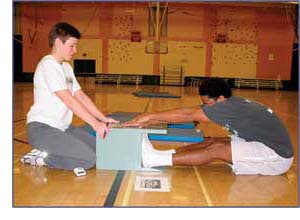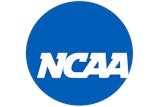A Wisconsin recreation agency gives adults a chance to retake a popular school fitness test
 Photo of man taking a sit-and-reach test
Photo of man taking a sit-and-reach test
But Kelliher's eagerness to lace up and hit the road eventually caught up with her -- for good and bad. On one hand, her cardiovascular endurance was never better. "When I was 30, I had some tests done at the University of Wisconsin and I was just off the charts aerobically. They couldn't even measure it," says Kelliher, now the supervisor of adult sports and fitness for Madison (Wis.) School & Community Recreation (MSCR). "But I flunked flexibility because I never did any stretching. Back then, I just put on my shoes and went."
In all likelihood, had Kelliher been a school-age child during that decade, she would have had difficulty passing the sit-and-reach test, one of five components of the Presidential Physical Fitness Test. A program administered in schools since 1966 by the President's Council on Physical Fitness and Sports, an agency of the U.S. Department of Health and Human Services, the test has over the years gauged the physical fitness of millions of students ages 6 to 17 through five assessments: a sit-and-reach test (which measures flexibility), pull-ups or push-ups (upper-body strength), sit-ups (abdominal strength), a one-mile run/walk (cardiovascular endurance) and a 30-foot shuttle run (speed and agility).
Those individuals who, for all five assessments, score in the 85th percentile or higher for their age group receive a Presidential Physical Fitness Award. Children who test at the 50th percentile and above receive a National Physical Fitness Award, and all others receive Participant Physical Fitness Awards. Each award includes a colored patch -- blue (Presidential), red (National) or white (Participant) -- and a certificate signed by the president.
Most members of Generation X, though, could only earn the Presidential fitness award as schoolchildren. The President's Council didn't introduce the National award until 1985, and the Participant award didn't surface until 1991. But thanks to a program being offered this month by MSCR, adult Madison residents are getting a second chance to earn their blue patches. MSCR staff will administer the Presidential Physical Fitness Test on April 26 at Madison Memorial High School using modified fitness standards that borrow from both the official President's Council guidelines and those published by the Dallas-based Cooper Institute. The modifications -- developed by a Madison resident who pitched Kelliher the idea of creating an adult rec program centered on the Presidential fitness test -- accommodate individuals of both sexes and all ages. For example, to earn a Presidential patch, men ages 37 to 41 would need to do 45 sit-ups in one minute, 41 push-ups, reach 38 centimeters on the sit-and-reach test, and finish the shuttle run in 9.7 seconds and a mile-and-a-half run in 10 minutes, 14 seconds.
While such standards may initially seem daunting to some, Kelliher anticipates that plenty of Madison residents will take advantage of this offer to jog down memory lane. For one thing, MSCR staff members have been nothing but enthusiastic at the chance to show that they still have what it takes to be fit, and to provide members of the community an opportunity to do the same. Kelliher's initial proposal to administer the Presidential fitness test program immediately conjured up fond school-time memories among some of her colleagues of head-to-head gym class competitions. "Some people are saying, 'I have a patch somewhere at home,' " she says. "They're all busy digging them out."
Obviously, though, those GenXers who failed to earn a Presidential award are not likely to view these tests through rose-colored glasses. "In some, there's always going to be the competitive spirit, especially if you were athletically gifted. It's almost natural," says Christine Spain, director of research, planning and special projects for the President's Council on Physical Fitness and Sports. "For others, it's more of, 'God, I just want to get to that number.' "
Thus the council's recent development of what it believes is a more accessible fitness program for the broader population. In 2003, the council unveiled its President's Challenge (presidentschallenge.org), which includes the trademarked Presidential Fitness award programs for schoolchildren, as well as two new programs designed primarily for adults (although youths, too, are welcome to participate).
The Active Lifestyle program challenges adult participants to log 30 minutes of physical activity five times a week for six weeks (youths are encouraged to record 60 minutes of daily activity). The Presidential Champions program, meanwhile, is designed for those who already consider themselves to be physically active. Adult participants shoot for bronze, silver or gold awards, which can be earned by participating in various physical activities, each holding a specific point value, to accumulate 20,000, 45,000 or 80,000 points, respectively. The program limits participants to accumulating a maximum of 750 points daily -- which, for example, would allow someone who runs 5 miles each day to earn a bronze medal in about six weeks.
Presidential Champions program participants are encouraged to use the personal activity log software and other tools on the President's Challenge web site to track their progress. Approximately 200,000 people have done so, according to Melissa Johnson, executive director of the President's Council on Physical Fitness and Sports. Of those web users, many belong to groups, including corporations like Home Depot and Trek Bicycles, and Johnson's favorite example, the Wisconsin Governor's Challenge, initiated last April by Gov. Jim Doyle. Modeling his program on the President's Challenge, Gov. Doyle challenged Wisconsinites to spend six weeks getting themselves in shape.
"Almost 20,000 Wisconsinites signed up last spring, and now they're getting the chance to do it again," says Johnson, referring to the Winter Governor's Challenge, launched in February. "They're using our President's Challenge program because it's a free tool that's in the public domain."
Johnson and Spain are hopeful that other government agencies, recreation departments included, will also consider adopting the President's Challenge for inclusion in their slate of fitness programs. As of this writing, no public recreation agencies had registered groups on the President's Challenge web site. "And it's a natural for them," says Spain. "But they already have so many of their own programs. I know eventually they'll be looking for new ways to motivate people and reward them for committing to and staying with a program. When they run out of ideas, hopefully they'll try ours."
In the meantime, President's Challenge staffers are curious to see how popular MSCR's adult Presidential Fitness award program becomes in Madison, and whether the program has national appeal. Kelliher, for one, thinks it does. "The people in Indianapolis [where the President's Challenge staff is headquartered] said we'd be the first in the nation that would be doing it for adults," she says. "They were kind of excited to hear what our results might be and whether or not we'll have to adjust the standards."
As for those fitness awards criteria, do adults care as much now as they did when they were kids if they can do more push-ups or finish the shuttle run faster than their peers? "Some people with whom I've spoken are going to use them as motivation to get into shape," says Kelliher, though she acknowledges that for some, including herself, it's still all about the competition -- whether against oneself or others. "You need a challenge. If I get a red patch this year, if I work on it maybe next year I can get a blue one."




































